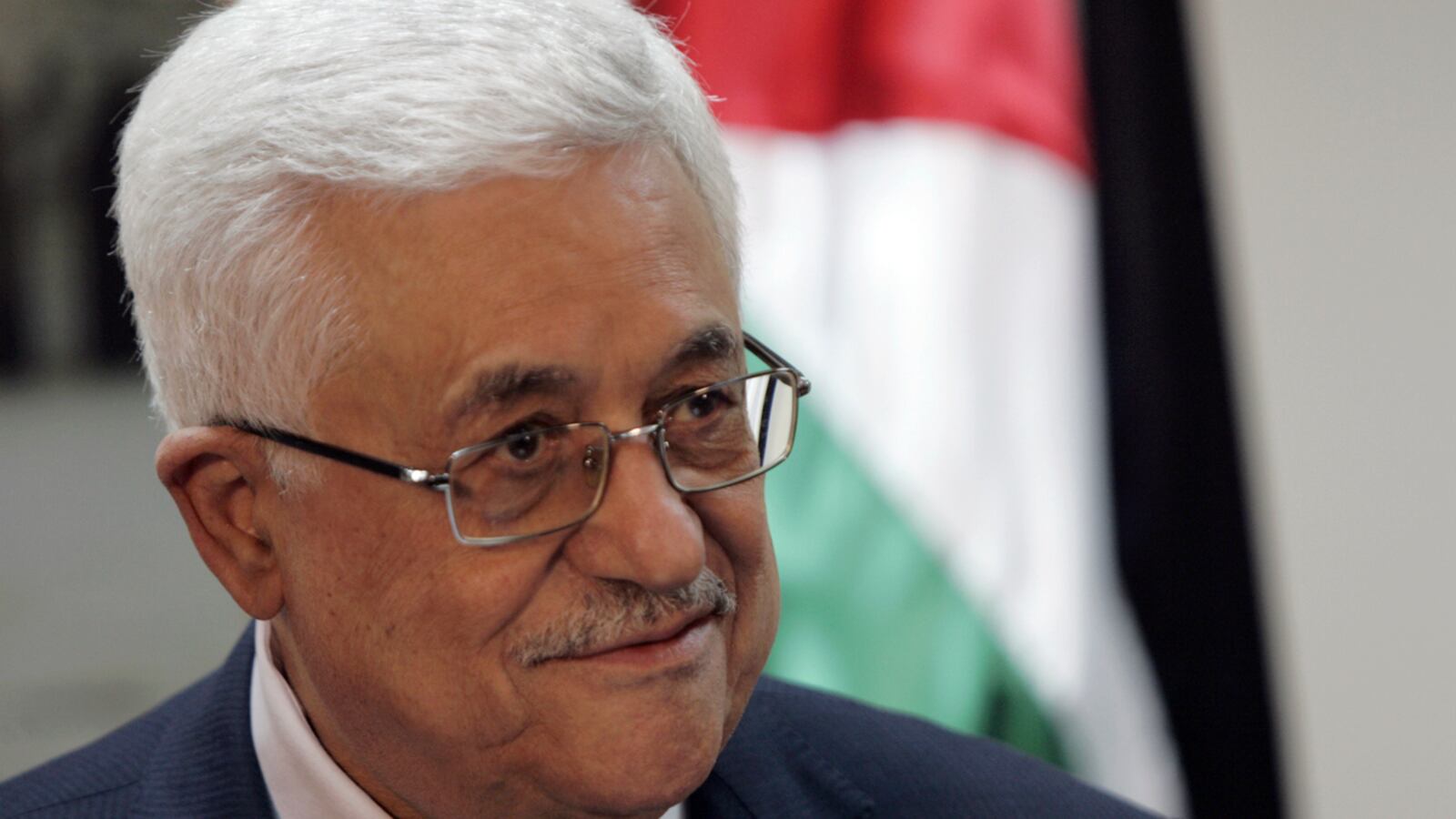These are tough times for Palestinian leader Mahmoud Abbas. Two months after he asked the United Nations to accept Palestine as a state, the membership bid is all but dead. Aid from the United States is drying up. Last month in Cairo, another attempt to make peace with his rivals in the Islamic Hamas group fell flat.
Now, The Daily Beast has learned that one of Abbas’s closest advisers drafted a letter to Israeli Prime Minister Benjamin Netanyahu in the past month informing him that Abbas intends to dismantle the Palestinian Authority and transfer “all powers and responsibilities” over everyday life in the West Bank back to Israel. The letter has not been sent and there’s no indication that Palestinian leaders intend to relay it to the Israelis anytime soon. Instead, it appears to be part of a contingency plan in case Abbas feels he has exhausted his political options. A source who saw it said the letter outlined a staged handover of authority over each realm of government, including security, education and health.
The source, who was shown the letter while meeting with Palestinian officials, described it as two-pages long and addressed to Netanyahu. Abbas’s name appears at the bottom but the letter is unsigned. The source said it was drafted by Saeb Erekat, a longtime peace negotiator and aide to Abbas. In a conversation with The Daily Beast, Erekat refused to discuss the letter but did not deny its existence. Two Palestinian officials said a committee composed of top PLO members had been discussing the possibility of dismantling the Palestinian Authority should the membership campaign at the U.N. fail—but only as one option among several. Alternatives included calling a quick election in the West Bank and Gaza and seeking an international trusteeship for the Palestinian territories. The officials said the committee had met three times in the past month—one of them referred to the meetings as “brainstorming sessions”—but did not come to any decision.

Why Palestinians decided to put the idea of dismantling the Palestinian Authority in writing in unclear. The PA was established in 1994 under the Israeli-Palestinian Oslo agreement and was meant to govern the West Bank and Gaza for a period of three to five years until the two sides reached a final peace accord. Seventeen years later, an agreement has yet to be negotiated.
Lately, a growing number of Palestinians around Abbas are saying the PA has become too convenient for Israel. Its institutions manage the daily lives of Palestinians, sparing Israel the hassle and the expenditure. Palestinian policemen help prevent suicide attacks and cross-border raids, allowing Israel to deploy far fewer soldiers in the West Bank than in the past. All the while, Israel continues to control the territory and expand Jewish settlements, eating up land that Palestinians want for their state. Erekat has described the situation as a win-win for Israel. In a meeting with Palestinian diplomats this past summer, he said: “If the PA cannot achieve independence, it’s better that it didn’t exist at all.”
That sentiment is reinforced by the fact that the PA is already teetering anyway. For two months now, Israel has withheld the funds it collects in customs revenue on behalf of the Palestinian Authority—around $100 million monthly. The money amounts to about half the PA’s operating budget. Without it, Palestinian Prime Minister Salam Fayyad has had to borrow money from banks to pay the salaries of government employees and other bills and is now overleveraged. Israel says it’s withholding the money to punish Palestinians for their UN membership bid and for Abbas’s renewed effort to reconcile with Hamas.
There’s another reason as well. When Hamas traded Israeli soldier Gilad Shalit for about 1,000 Palestinian prisoners in October, the Islamic group pledged to pay each prisoner a $2,000 stipend, according to both Israeli and Palestinian sources. Abbas, fearing Hamas was buying the prisoners’ support, pledged to pay each prisoner $5,000. Israeli leaders see the payment as a form of terrorist financing and have pressed Abbas to stop the disbursement. (Israel announced this week it would resume the revenue transfers for now).
The potential implications of the PA’s sudden disappearance would be dramatic. To prevent chaos, Israel would have to resume its pre-1994 role as full-fledged occupier in the West Bank. A study the Israeli government commissioned several years ago put the cost of re-asserting control in the Palestinian territory at billions of dollars per year. Robert Serry, the United Nations secretary general’s envoy in the region, said in an interview last month that Israel would be on the hook for that outlay. “The Israelis shouldn’t expect us to again finance the consequences of what may happen.... Israel will again bear the full consequences of being the occupier.”
Israel would also have to deploy whole units to the West Bank, a measure that, besides costing money, would exacerbate political divisions within Israeli society. Polls consistently show around half of all Israelis want to end the occupation, not expand it. But Israel’s biggest challenge would be in dealing with the thousands of armed Palestinian security men employed by the PA who are unlikely to agree to work for Israel.
For Palestinians, the consequences would be no less troubling. The PA is the biggest employer in the West Bank and Gaza, with around 200,000 civil servants on its payroll. Their salaries feed about a quarter of the population of the Palestinian territories. A sudden collapse of the system would surely trigger an economic crisis—a possibility that worries many Palestinians. In a September poll conducted by the Palestinian Center for Policy and Survey Research, 61 percent of Palestinians said they opposed dismantling the PA while 36 percent said they supported it.
For that reason and others, there are plenty of people on both the Israeli and Palestinian side who believe the scenario is unlikely. Nasser al-Qidwa, a noted Palestinian diplomat who served for years as the PLO’s observer at the United Nations said leaders “just don’t give up power voluntarily,” in the Middle East. “I can’t see it happening now or anytime,” he said in his office in Ramallah recently. Similarly, the former head of Israel’s national security council, Giora Eiland, said he smelled a bluff. “There is a lot of psychological warfare that exists here and I’m guessing that’s the case now as well.”
Still, the fact that Palestinians drew up the letter suggests a deep despair among leaders in Ramallah. Israelis and Palestinians have had no real negotiations for nearly three years now, one of the longest diplomatic dry spells in two decades. And officials on both sides say there’s no credible back channel where sensitive messages can be conveyed during crises. “I’m aware, I’m not naive, that they all use it as a threat,” Robert Serry, the U.N. representative, said about Palestinian officials raising the specter of the PA’s collapse. “But when parties are involved in a poker game like this and [their bluff] is called, sometimes these things may become a self-fulfilling prophecy.”





